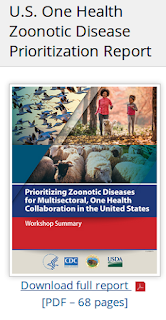#14,259
Yesterday's MMWR carried a detailed investigation report into an antibiotic- resistant Salmonella enterica Newport outbreak - linked to U.S. Beef and soft cheeses from Mexico - which began in June of 2018 and continued until March of this year.
While this particular outbreak appears to be over, the CDC CDC estimates Salmonella causes about 1.2 million illnesses, 23,000 hospitalizations, and 450 deaths in the United States every year.According to the CDC:
- Most persons infected with Salmonella develop diarrhea, fever, and abdominal cramps 12 to 72 hours after infection. The illness usually lasts 4 to 7 days, and most persons recover without treatment.
- However, in some persons, the diarrhea may be so severe that the patient needs to be hospitalized.
In 2002, CIDRAP carried a report called Drug-resistant Salmonella Newport in dairy cattle is growing threat, CDC expert says, detailing its dramatic rise.Four months ago, in The 8 Zoonotic Diseases Of Most Concern In The United States, in a joint CDC, USDA, DOI report listing the top (n=56) zoonotic diseases of national concern for the United States, Salmonellosis came in 2nd only to Avian flu.
We've already looked at several recent Salmonella outbreak investigations this summer, including a Warning On Pig-Ear Dog Treats. Other outbreaks included backyard poultry, Hedgehogs and Papayas.
Although this particular outbreak appears to have ended, the threat of future Salmonella enterica outbreaks remains, and the food safety advice provided in this week's MMWR (cooking beef to a proper temperature, avoiding all soft, unpasteurized cheeses) should be taken seriously.I've only reproduced the summary, and abstract, from a much longer report. Follow the link to read it in its entirety.
Outbreak of Salmonella Newport Infections with Decreased Susceptibility to Azithromycin Linked to Beef Obtained in the United States and Soft Cheese Obtained in Mexico — United States, 2018–2019
Weekly / August 23, 2019 / 68(33);713–717
Ian D. Plumb, MBBS1; Colin A. Schwensohn, MPH1; Laura Gieraltowski, PhD1; Selam Tecle, MPH2; Zachary D. Schneider, MPH1,3; Jennifer Freiman, MPH4; Andrea Cote, DVM4; Douglas Noveroske, MPH4; Jonathan Kolsin, MPH5; Joshua Brandenburg1,3; Jessica C. Chen, PhD1; Kaitlin A. Tagg, PhD1,6; Porscha Bumpus White, MS1; Hazel J. Shah, MPH1; Louise K. Francois Watkins, MD1; Matthew E. Wise, PhD1; Cindy R. Friedman, MD1 (View author affiliations) View suggested citation
Summary
What is already known about this topic?
Decreased susceptibility to azithromycin is rare among Salmonella serotypes that cause human infections in the United States. If antibiotic treatment is indicated, azithromycin is recommended as an oral therapy.
What is added by this report?
During June 2018–March 2019, an outbreak caused by multidrug-resistant Salmonella Newport with decreased susceptibility to azithromycin led to 255 infections and 60 hospitalizations. Infections were linked to Mexican-style soft cheese obtained in Mexico and beef obtained in the United States.
What are the implications for public health practice?
Whole genome sequencing can be used in Salmonella outbreak investigations for rapid prediction of antimicrobial resistance and can link cases to each other and to possible sources of infection.
Abstract
In September 2018, CDC identified Salmonella enterica serotype Newport (Newport) infections that were multidrug resistant (MDR), with decreased susceptibility to azithromycin, a recommended oral treatment agent.
Until 2017, decreased susceptibility to azithromycin had occurred in fewer than 0.5% of Salmonella isolates from U.S. residents. This report summarizes the investigation of a multistate MDR Salmonella outbreak conducted by CDC, state and local health departments, and the U.S. Department of Agriculture’s Food Safety and Inspection Service.
During June 2018–March 2019, 255 cases of infection with the outbreak strain were identified in 32 states; 43% of patients (89 of 206 with information on travel) reported recent travel to Mexico. Infections were linked to consumption of soft cheese obtained in Mexico and beef obtained in the United States.
Consumers should avoid eating soft cheese that could be made from unpasteurized milk, regardless of the source of the cheese. When preparing beef, a food thermometer should be used to ensure that appropriate cooking temperatures are reached. When antibiotic treatment is needed for a patient, clinicians should choose antibiotics based on susceptibility testing wherever possible.(Continue . . . )
While we often focus on exotic epidemic disease threats like MERS-CoV, Avian Flu, or Zika - in truth - the annual burden of disease from `lesser' bacterial zoonotic threats - like Salmonella, Listeria, and E. coli - is considerable.
Fortunately, many of these illnesses are preventable. Practicing good hand hygiene, and following some common sense precautions can significantly lower your risk of infection.

